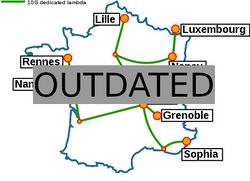Grid5000:Home
|
Grid'5000 is a large-scale and versatile testbed for experiment-driven research in all areas of computer science, with a focus on parallel and distributed computing including Cloud, HPC and Big Data. Key features:
|
Five random publications that benefited from Grid'5000 (at least 2937 overall):
- Philippe Ledent, Radu Mateescu, Wendelin Serwe. Testing Resource Isolation for System-on-Chip Architectures. MARS 2024 - 6th Workshop on Models for Formal Analysis of Real Systems, Apr 2024, Luxembourg, Luxembourg. pp.1-40, 10.48550/arXiv.2403.18720. hal-04573384 view on HAL pdf
- Donatien Schmitz, Guillaume Rosinosky, Etienne Rivière. Justin: Hybrid CPU/Memory Elastic Scaling for Distributed Stream Processing ⋆. DAIS 2025 - 25th International Conference on Distributed Applications and Interoperable Systems, Daniel Balouek; Ibéria Medeiros, Jun 2025, Lille, France. pp.1-17. hal-05081993 view on HAL pdf
- Diego Amaya-Ramirez. Data science approach for the exploration of HLA antigenicity based on 3D structures and molecular dynamics. Bioinformatics q-bio.QM. Université de Lorraine, 2024. English. NNT : 2024LORR0071. tel-04708399 view on HAL pdf
- Théophile Dubuc. Détection d'anomalies de latence dans les systèmes distribués avec eBPF. Système d'exploitation cs.OS. Ecole normale supérieure de lyon - ENS LYON, 2024. Français. NNT : 2024ENSL0109. tel-05064342 view on HAL pdf
- Mathieu Bacou. FaaSLoad : fine-grained performance and resource measurement for function-as-a-service. 2024. hal-04836444 view on HAL pdf
Latest news
Failed to load RSS feed from https://www.grid5000.fr/mediawiki/index.php?title=News&action=feed&feed=atom: Error parsing XML for RSS
Grid'5000 sites
Current funding
As from June 2008, Inria is the main contributor to Grid'5000 funding.
INRIA |
CNRS |
UniversitiesUniversité Grenoble Alpes, Grenoble INP |
Regional councilsAquitaine |


